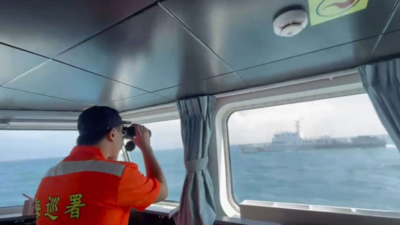
A member of the Taiwan Coast Guard monitors a China Coast Guard boat as it passes near the coast of Matsu islands, Taiwan. (Picture credit: AP)
Taiwan
reported the detection of 153 Chinese
military aircraft
around its airspace, marking a record number in a single day, according to official data released on Tuesday, reported the news agency AFP.
The surge in aircraft sightings followed large-scale military drills conducted by China, which included fighter jets, drones, warships, and coast guard boats encircling the island.
The 25-hour period leading up to 6:00 am (local time) on Tuesday saw Taiwan's
defence ministry
on high alert, as 111 of the detected aircraft crossed the median line of the Taiwan Strait, a previously respected boundary between mainland China and the self-governed island.
The drills come at a time when tensions are constantly rising between
Taipei
and
Beijing
. Taiwan’s President,
Lai Ching-te
’s administration has pledged to protect Taiwan’s democracy.
In response, Taiwan deployed its own "appropriate forces" and heightened the alert status of its outlying islands. The island’s government condemned China’s manoeuvres as "irrational and provocative," while the
United States
described the actions as "unwarranted" and warned that they risked escalating tensions in the region.
Japan
also expressed concerns, with its government monitoring the situation closely and scrambling fighter jets near its southern Yonaguni Island. Japan’s deputy chief cabinet secretary, Kazuhiko Aoki, confirmed that the concerns were conveyed to Beijing.
China, which claims Taiwan as its territory, has not ruled out the use of force to bring the island under its control. The latest exercises, named
Joint Sword 2024B
, are the fourth round of large-scale drills in just over two years, with Beijing signalling them as a warning to pro-independence movements in Taiwan.
Lai, who has been more vocal about defending the island’s sovereignty compared to his predecessor, reiterated his commitment to resisting annexation and safeguarding national security.

 1 month ago
15
1 month ago
15










 English (US) ·
English (US) ·